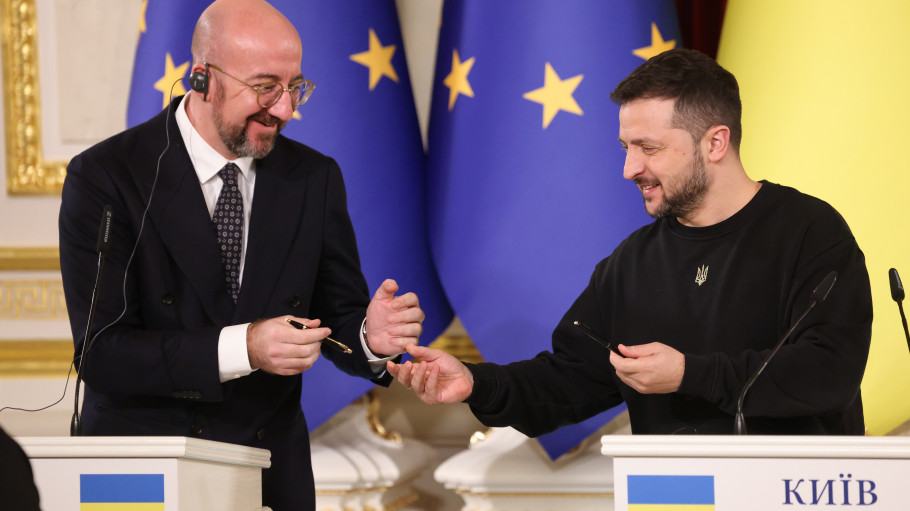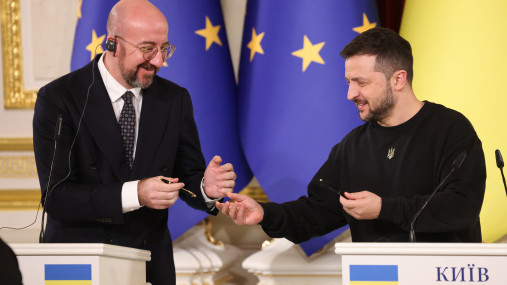
Press releases » Further delaying and weakening EU sanctions against Russia risks to be self-defeating and a historic mistake, says EUROFER
Further delaying and weakening EU sanctions against Russia risks to be self-defeating and a historic mistake, says EUROFER
Downloads and links
Recent updates

Brussels, 01 December 2023 – Further delays in implementing EU sanctions against Russian steel semifinished products would have a perverse effect, ultimately fuelling Putin’s war machine against Ukraine. The EU Council should reject additional exemption requests from a few member states defending the lucrative business model of few steel rerollers. The trade dynamic that takes advantage of cheap steel imported from Russia while aiding the supply to its military and related downstream sectors must come to an end, states the European Steel Association.
“The opportunistic interest of a handful of steel processing enterprises in the EU is undermining the overall objective of EU sanctions against Russia, where steel plays a strategic role not only in the overall Russian economy but directly in the Russian military machine engaged in the unlawful war against Ukraine. The EU Member States should not perpetuate such a perverse system by approving another exemption, having already accepted a 2-year delay in banning the import of Russian semi-finished steel products into the EU”, said Axel Eggert, Director General of the European Steel Association (EUROFER).
Additionally, the non-enforcement of steel sanctions against Russian semis fuels unfair competition and an uneven playing field within the EU internal steel market. The business model of European rerollers relies on opportunistic cost advantages gained via cheap imports from third countries, in contrast to the European integrated steel industry, whose full production cycle is ‘made in Europe’, maximising industrial, economic, environmental and social value creation in the EU. Furthermore, EU integrated steel producers have promptly aligned with EU sanctions and ceased importing Russian coal.
“EU Member states should be very clear that no further exemptions for Russian steel imports must be allowed. Weakening the current EU sanctions against Russia risks to be self-defeating and a historic mistake”, concluded Mr. Eggert.
Photo copyright: European Union
Contact
Lucia Sali, Spokesperson and Head of Communications, +32 2 738 79 35, (l.sali@eurofer.eu)
About the European Steel Association (EUROFER)
EUROFER AISBL is located in Brussels and was founded in 1976. It represents the entirety of steel production in the European Union. EUROFER members are steel companies and national steel federations throughout the EU. The major steel companies and national steel federation of Turkey and the United Kingdom are associate members.
The European Steel Association is recorded in the EU transparency register: 93038071152-83.
About the European steel industry
The European steel industry is a world leader in innovation and environmental sustainability. It has a turnover of around €130 billion and directly employs around 306,000 highly-skilled people, producing on average 152 million tonnes of steel per year. More than 500 steel production sites across 22 EU Member States provide direct and indirect employment to millions more European citizens. Closely integrated with Europe’s manufacturing and construction industries, steel is the backbone for development, growth and employment in Europe.
Steel is the most versatile industrial material in the world. The thousands of different grades and types of steel developed by the industry make the modern world possible. Steel is 100% recyclable and therefore is a fundamental part of the circular economy. As a basic engineering material, steel is also an essential factor in the development and deployment of innovative, CO2-mitigating technologies, improving resource efficiency and fostering sustainable development in Europe.

Brussels, 26 February 2026 — Europe’s steel industry has warned that the current draft Industrial Accelerator Act could direct public support for low-carbon steel to producers outside the European Union, unless lawmakers include and tighten ‘Made in Europe’ provisions.
Brussels, 24 February 2026 - Europe’s energy-intensive industries have set out a series of proposals to ensure that the EU’s upcoming Electrification Action Plan delivers on its objectives to stimulate and boost electricity consumption in industry. In a joint position paper, industries warn that persistently high electricity prices risk undermining industrial competitiveness and decarbonisation efforts. They call for a policy framework that will enable EU industry in pursuing decarbonisation and industrial competitiveness.
Energy-intensive industries (EIIs) provide direct employment to around 2.6 million people in the EU and represent the foundations of critical and strategic value chains for the EU economy and society. The current economic and energy outlook of the European Union is making investments in electrification and the continued business operation of our sectors at serious risk, should the energy-cost challenge not be solved.